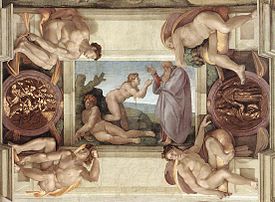For those who look to the Bible to restrict marriage to one man and one woman, the primordial source is Genesis 2, the second account of the creation of humanity, in which God forms a man out of the dust and a woman out of the man’s rib. The chapter seems to set up what they now call “biblical marriage,” declaring (in the King James Version), “Therefore shall a man leave his father and his mother, and shall cleave unto his wife: and they shall be one flesh.”
So how can this account be considered supportive of same-sex marriage?
For starters, the Hebrew word adam that is translated as “man” means “humanity” or “human being” — in the genderless sense that was once common English usage (as in, “man is the measure of all things”). Thus, in Genesis I.26, God says, “Let us make adam (humanity) in our image.” Unlike English, Hebrew differentiates adam from the gendered word for man, ish.
In Genesis 2, the person we know as Adam is repeatedly identified simply as ha-adam — the human. Thus, Genesis 2.18 has God saying, “It is not good for the human to be alone. I will make a fitting helper for him.” (“Him” because adam is a masculine noun in Hebrew in the same way that nauta — sailor — is a feminine noun in Latin.) Note that God does not say anything about procreation as the reason for instituting this human relationship. Procreation is the order of the day in Genesis 1 (“be fruitful and multiply”), but that injunction has nothing to do with marriage.
But what about Genesis 2.24: “Therefore a man shall leave…”? Isn’t that a mandate for “biblical marriage”?
No. Although traditional English translations employ the prescriptive future tense, the Hebrew is simply the descriptive present, now using the gendered ish: “Therefore a man leaves his father and his mother, and cleaves to his wife, so that they become one flesh.” Genesis 2 is a just-so story, explaining why, at the time it was written, a guy would leave his parents and establish a new marital relationship.
In a word, Genesis 2 is all about the human need for permanent companionship — companionship of an intimate fleshly kind. Whoever wrote it would, I believe, understand exactly what the desire for same-sex marriage is all about — and why it is good.






